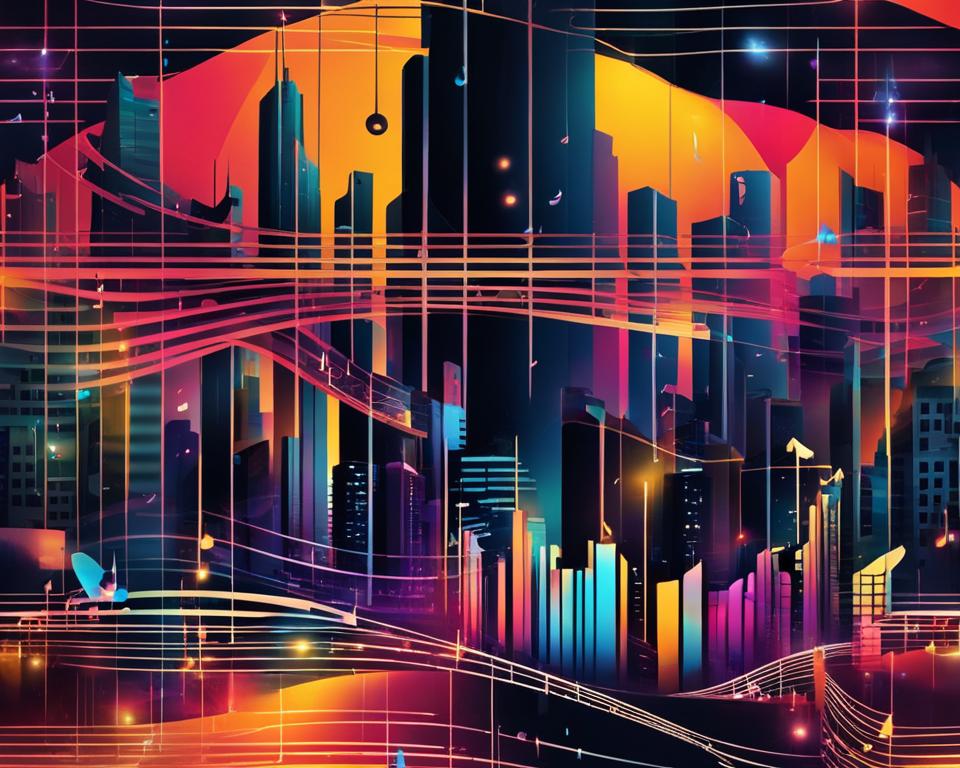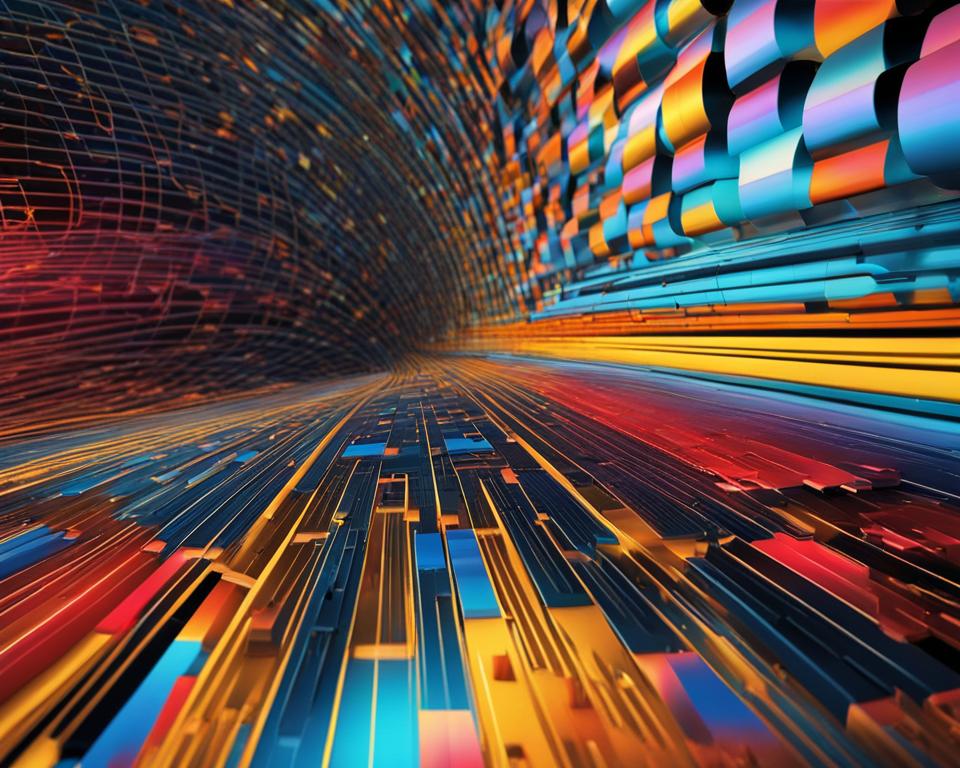We are witnessing a new era in the music industry with the integration of Artificial Intelligence (AI). The use of AI in music creation has gained significant popularity among musicians, producers, and fans in recent years. This technology allows us to analyze and understand music patterns and generate original compositions that aim to evoke human emotions.
In this article, we will explore the development of AI music, its capabilities to function as composers and transformers of music. We will also discuss the impact of AI music on artists and the music industry, as well as its role in music recommendation systems and video production.

Join us on a journey exploring the boundaries of AI music as we envision future trends and changes in the music industry. Let’s delve into the potential of AI-infused music, where creativity meets technology, and explore the impact it could have on the future of music.
The Development of AI Music
In this section, we will uncover the evolution of AI music and how it has become an integral part of the music industry. AI music analysis and algorithms have come a long way in understanding musical patterns and generating original compositions.
“AI has given us more creative options and ways of expressing music. We are not limited to what has come before – David Cope”
Through machine learning techniques, AI models can now create an impressive array of sounds. AI music works by feeding a large amount of data into an algorithm and training the model to learn the underlying patterns. This model can then generate compositions based on the input data and produce an entirely new piece of music that sounds like it was made by human input.
The complexity of AI music rendering has increased with time, and AI music analysis algorithms quickly identify beat, tempo, structure, harmony, melody, chord progression, and other elements of music. This creates a collaborative environment for human and AI musicians, where AI assists humans in producing high-quality content efficiently and promptly.
In conclusion, researchers and developers are continually pushing the boundaries of AI music to create more sophisticated algorithms that can create unique sounds that flourish with human expression and feelings.
AI as a Composer and Transformer
Artificial intelligence has proven itself to be an advanced composer and transformer of music, generating unique melodies, harmonies, and rhythms that resonate with human emotions and preferences. Through AI, existing musical pieces can be transformed through remixing, sampling, and mash-up techniques, creating entirely new works of art.
AI music judges can analyze musical compositions and provide feedback based on a predetermined set of criteria, while AI music mixing algorithms can efficiently balance the sound levels, equalization, and other audio elements to produce a polished final product.
One example of AI-powered music transformation is Amper Music, which provides personalized music compositions for video content based on mood, style, and length. Their AI algorithms use machine learning to generate unique soundtracks that perfectly match the visual elements of the video.
The capabilities of AI music composition and transformation are continuously evolving, and we can expect more breakthroughs as the technology advances.
The Effects of AI Music on Artists and the Industry
AI technology is transforming the music industry, providing musicians with innovative tools to enhance their creative process. AI-based software and applications can assist artists in generating new ideas, experimenting with sounds, and making music production more accessible.
One way for artists to make AI music is by using AI-powered music composition software such as Amper Music or AIVA. These applications analyze musical patterns and compose original pieces with minimal human intervention, offering new ways to generate unique melodies, harmonies, and rhythms.
Another way for artists to explore the intersection of music and AI is through AI music video production. By utilizing AI music video editors such as Resonance AI or Iconic Labs, musicians have the tools to create visually stunning music videos through automated editing, visual effects, and computer-generated imagery.
While AI technology offers many benefits for musicians, there are also concerns regarding the potential displacement of human musicians and the evolution of roles within the industry. It’s important to continue discussions on the ethical considerations of AI in music and ensure that AI is used to enhance human creativity, not replace it.
AI Music Recommendation Systems
At the heart of music streaming platforms lies an intricate system of AI algorithms that analyze user behavior and preferences to provide personalized music recommendations. These AI music recommendation systems have revolutionized the way we discover and consume music, creating a customized listening experience for every user.
By analyzing user data such as listening habits, search history, and liked songs, AI algorithms can generate recommendations that suit individual preferences. This process allows for the discovery of new artists and music styles based on the user’s taste, leading to a more diverse listening experience.
However, building an effective AI music recommendation system comes with its own set of challenges. The data used to create recommendations needs to be accurate and relevant, and there is a risk of overgeneralizing user preferences and limiting exploration to specific genres.
Additionally, data privacy concerns arise with the use of user data for recommendations. Platforms need to ensure that user information is secure and not being misused in any way.
Overall, AI-powered music recommendation systems have become an integral part of the music listening experience, and their continuous development will only enhance the user’s experience further.
AI Music Video Production
We are witnessing an exciting trend where AI is using its intelligence to revolutionize the music video production industry. AI technologies are being utilized by video editors to create visually compelling music videos through automated editing, visual effects, and computer-generated imagery. These technologies have improved video production speed and efficiency, while reducing costs, allowing artists to focus more on their creativity and music.
AI music video editors have developed algorithms that analyze the rhythm, melody, and emotions conveyed in the music, allowing for video content to be precisely tailored to fit the mood of the music. AI has also made it possible to create custom video content based on the viewer’s preferences. With AI music video editors involved, music videos can now be more meaningful, relatable, and enjoyable for fans.
AI-based music video projects showcase the capabilities of AI in producing visually impactful content. Some examples include
| Project Title | Description |
|---|---|
| Songularity | A music video that features AI-created graphics and a 3D animated artist heard and seen on the screen. |
| Alter Ego | A video content creation platform that uses AI to engage the audience by generating personalized music videos. |
| Deep Voodoo | A music video that combines AI-generated visuals and live-action footage to create an abstract narrative. |
We can expect to witness more innovative AI-generated music videos in the near future that leave a lasting impact on viewers.
AI-driven video production tools have significantly changed the possibilities of music video production. In the coming years, we believe that it will become more accessible and affordable, enabling independent artists to make professional-level music videos. As a result, we can expect to see a surge of creative and inspiring music visuals.
Boomy AI Music: The Rise of AI in Pop Music Production
As we’ve discussed in previous sections, AI has made significant strides in transforming the music industry, from composition to recommendation systems. However, one platform that has gained significant popularity in the pop music scene is Boomy AI Music.
Boomy utilizes the power of AI algorithms to assist artists in creating professional-sounding tracks. Their platform offers a diverse range of customizable tools, from melody creation to audio engineering, that streamline the music production process. By using Boomy’s intuitive interface, even novice musicians can create polished and cohesive tracks quickly.
Moreover, Boomy has become an integral tool for independent artists, providing them with an affordable alternative to traditional recording studios. With Boomy, artists can save time and money without sacrificing quality, democratizing music production and distribution.
However, some music experts have raised concerns about the impact of AI on artistic expression and originality. They argue that AI-generated music lacks the nuances and subjective elements that are inherent in human composition, potentially leading to music that lacks emotional depth and authenticity. Nevertheless, many artists and producers have embraced AI technology as an innovative tool that enhances their creativity and productivity.
Overall, Boomy AI Music is a prime example of how AI is disrupting the traditional music industry and opening doors for new possibilities. As AI-powered music production continues to evolve, we can expect to see further advancements in technology and an expanded democratization of music creation and distribution.
The Future Trends of AI Music
As AI technology continues to advance, there is no doubt that it will continue to transform the world of music. We expect to see significant developments in AI music composition, with automated algorithms becoming more complex and sophisticated.
Real-time collaborations between humans and AI may become the norm, with AI generating ideas and suggestions in real-time alongside human performers. This could lead to a new era of music creation, where performers and machines work together to produce music that transcends current limitations.
Another potential trend is the incorporation of AI into live performances. As AI algorithms become more adept at analyzing and predicting audience preferences, we could see AI-generated music and visuals seamlessly integrated into live shows, creating immersive and interactive experiences for concertgoers.
Expert insights suggest that ethical considerations will also be at the forefront of AI music development. As AI programs become more autonomous, it will be essential to ensure that they are used in a responsible, transparent manner that respects the rights and artistic integrity of human creators.
“AI music has tremendous potential for growth and innovation, however, it’s important that we approach its development with care and consideration for the impact it may have on the music industry and society as a whole.”
Overall, we anticipate that AI music will continue to push the boundaries of creativity and redefine the role of technology in music production and consumption.
Expert Insights on AI Music
We have reached out to several experts in the field of AI music to gain insights into the benefits, challenges, and ethical considerations of using AI in music creation and consumption. Here are their perspectives:
“The use of AI in music is still in its infancy, but it has already shown great potential in aiding creativity and innovation. However, the integration of AI raises important questions around ownership, authenticity, and the future role of human musicians. The key will be to strike a balance between the capabilities of AI and the authenticity of human expression.”
“The democratization of music production through AI is a game-changer for the industry, making it accessible to artists who may not have had the resources or technical skills to create high-quality music before. However, as AI continues to advance, it’s essential to recognize the importance of human creativity and expertise and the role that AI should play in enhancing – not replacing – it.”
“While AI-powered music recommendation systems can provide a more personalized listening experience for consumers, there is a risk of creating ‘filter bubbles’ that limit exposure to new and diverse music. As such, it’s critical to ensure that music recommendation algorithms are transparent and inclusive, avoiding perpetuating biases and reinforcing existing preferences.”

Exploring the Boundaries of AI Music
As we’ve seen throughout this article, AI music is rapidly evolving and revolutionizing the way we create, consume, and interact with music. However, as with any emerging technology, there are still many unanswered questions and boundaries to explore.
One of the most pressing questions is how AI music will continue to intersect with human creativity. Some argue that AI will never be able to replicate the emotional depth and complexity of human expression, while others believe that AI could enhance and expand human creativity in ways we haven’t yet imagined.
Another boundary to consider is the ethical implications of using AI in music creation and consumption. As AI becomes more involved in the music industry, we must ensure that it is being used ethically and transparently, and that it doesn’t contribute to the exclusion or exploitation of human musicians.
Ultimately, exploring these boundaries and critically evaluating the role of AI in music is essential for the continued growth and success of both the music industry and the technology itself.
At the end of the day, we believe that AI has the potential to unlock new horizons in music creation and consumption, but it must be used responsibly and in harmony with human creativity.
So let’s continue exploring the boundaries of AI music, questioning, experimenting, and learning as we go. Who knows what the future holds?
